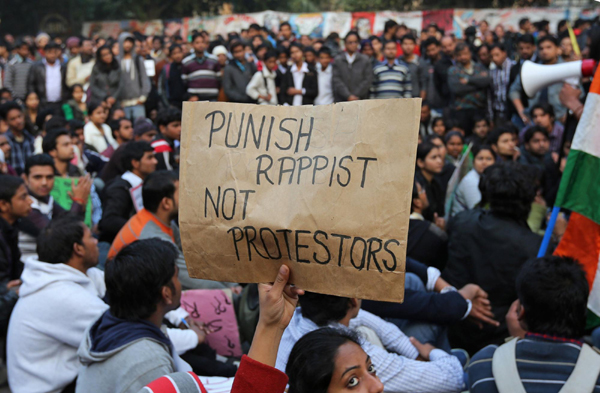NEW DELHI - Indian authorities throttled movement in the heart of the capital on Monday, shutting roads and railway stations in a bid to restore law and order after police fought pitched battles with protesters enraged by the gang rape of a young woman.
In an unusual televised address, Prime Minister Manmohan Singh called for calm following the weekend clashes in New Delhi and vowed to punish the rapists for their "monstrous" crime.
 |
|
A demonstrator holds a placard during a protest in New Delhi Dec 24, 2012. [Photo/Agencies] |
Singh's government, often accused by critics of being out of touch with the aspirations of many Indians, has been caught off-guard by the depth of the popular outrage as protests have snowballed and spread to other cities. India is seen as one of the most unsafe places in the world to be a woman.
Instead of channelling the outrage, the government has found itself on the defensive over the use of force against the protesters and complaints that it has done little in its eight years in power to create a safer environment for women.
The protests have been the biggest in the capital since 2011 demonstrations against corruption that rocked the government.
"People are not reacting to just one rape case. They are reacting to the general malaise, the frustration with the leadership. There is a feeling that the leadership is completely disconnected," said political analyst Neerja Chowdhury.
Police barricaded roads leading to India Gate, an imposing Arc de Triomphe-style war memorial in the centre of the city, that has become a hub of the protests by mostly college students. Many metro rail stations in fog-shrouded Delhi were also closed, crippling movement around the city of 16 million.
The protests overshadowed an official visit by Russian President Vladimir Putin and disrupted his schedule.
The 23-year-old victim of the Dec 16 attack, who was beaten, raped for almost an hour and thrown out of a moving bus in New Delhi, was still in a critical condition on respiratory support, doctors said.
In the weekend spasm of violent protests, police use batons, teargas and water cannon against demonstrators around the capital. Protests and candle-light vigils have also taken place in other Indian cities but they have been more peaceful.
"I appeal to all concerned citizens to maintain peace and calm. I assure you we will make all possible efforts to ensure security and safety of women in this country," Singh said in his televised address to the nation.
Singh has been under fire for remaining largely silent since the rape. He issued a statement for the first time on Sunday, a week after the crime. Sonia Gandhi, chief of the ruling Congress Party, has met some of the protesters to hear their demands.
Comments by political commentators, sociologists and protesters suggest the rape has tapped into a deep well of frustration that many Indians have over what they see as weak governance and poor leadership on social and economic issues.
"There is a huge amount of anger. People are deeply upset that despite so many incidents there has not been much response from the state and the government," said social activist Ranjana Kumari, director of the Centre for Social Research in Delhi.